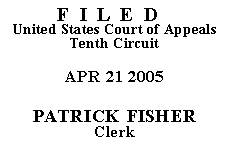

On April 29, 2004, Plaintiff and 48 other prisoners, among them Ezekiel Emanuel House, filed this suit, naming the State of Utah, Salt Lake County, the Salt Lake County Sheriff's Office Jail, Governor Olene S. Walker, sheriff Aaron D. Kennard, sheriff's deputies Paul Cunningham and Troy Dial, and "all [the county jail's] corrections officers and superior offices" as defendants. Complaint (4/29/2004) at App. C-6 - C-8. Although the original plaintiffs labeled their suit a class action on the civil cover sheet, the complaint names 49 prisoner plaintiffs individually. Moreover, a plaintiff may not serve as class representative pro se "because the competence of a layman is clearly too limited to allow him to risk the rights of others." Fymbo v. State Farm Fire & Cas. Co., 213 F.3d 1320, 1321 (10th Cir. 2000) (internal quotation marks omitted).
In their original complaint the prisoners raised a variety of contentions, including that (1) the prison food was very poor; (2) officers confiscated items purchased from the prison commissary; (3) officers beat prisoners, sometimes for racial reasons; (4) the grievance procedure denied prisoners due process; and (5) prison rules prevented prisoners from exchanging, selling, giving away, lending, or offering any property. On appeal Plaintiff presses only the commissary-item-confiscation claim.
On May 5, 2004, a magistrate judge granted Plaintiff's motion to proceed in forma pauperis, ordering him to make periodic partial payments of the $150 filing fee. The first payment of $0.87 was to be made within 30 days. On July 19, 2004, the district court dismissed the complaint without prejudice because Plaintiff had failed to make the $0.87 payment.
We review a district court's dismissal for failure to make a court-ordered filing-fee payment for abuse of discretion. See Cosby v. Meadors, 351 F.3d 1324, 1326 (10th Cir. 2003) (reviewing a dismissal with prejudice). A district court abuses its discretion by committing legal error, relying on clearly erroneous facts, or applying the law to the facts irrationally. See Soskin v. Reinertson, 353 F.3d 1242, 1247 (10th Cir. 2004). The district court did neither here; consequently, its dismissal without prejudice was not an abuse of discretion.
The district court calculated the $0.87 initial payment under 28 U.S.C. § 1915(b)(1). See Cosby, 351 F.3d at 132627 (describing statutory fee-payment scheme). When a prisoner has the means to pay but fails to do so, the district court may dismiss the action. Id. at 1327; Fed. R. Civ. P. 41(b) (authorizing dismissal for "failure of the plaintiff to . . . comply with . . . any order of court").
Plaintiff does not contend that he made the $0.87 payment, that he was unable to do so, that the payment was miscalculated under § 1915(b)(1), or that dismissal without prejudice was an inappropriate remedy. Rather, his contentions focus on the merits of his suit. Because the district court's dismissal was without prejudice, Plaintiff may yet obtain a merits decision: he need only stand ready to make the necessary payments next time he goes to district court.
Because we find no abuse of discretion, we AFFIRM. We GRANT Plaintiff's motion to proceed without prepayment of the appellate filing fee, but remind him that he remains obligated to make partial payments to this court until the entire fee is paid. This appeal counts as a strike against Plaintiff under 28 U.S.C. § 1915(g).
ENTERED FOR THE COURT
Harris L Hartz
Circuit Judge
*.After examining the briefs and appellate record, this panel has determined unanimously that oral argument would not materially assist the determination of this appeal. See Fed. R. App. P. 34(a)(2); 10th Cir. R. 34.1(G). The case is therefore ordered submitted without oral argument. This order and judgment is not binding precedent, except under the doctrines of law of the case, res judicata, and collateral estoppel. The court generally disfavors the citation of orders and judgments; nevertheless, an order and judgment may be cited under the terms and conditions of 10th Cir. R. 36.3.